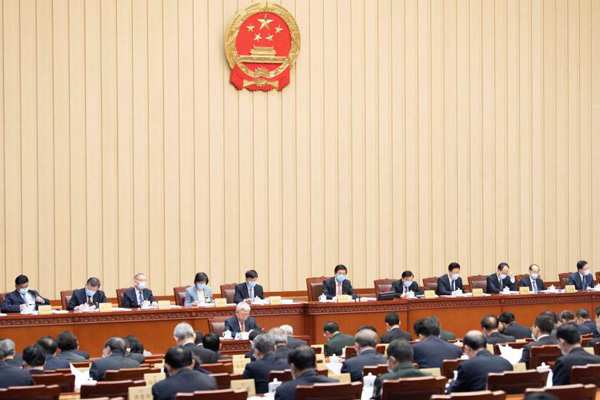Lawmakers meet to hear multiple reports

Li Zhanshu, chairman of the National People's Congress (NPC) Standing Committee, attends the 2nd plenary meeting of the 24th session of the 13th NPC Standing Committee in Beijing, capital of China, Dec. 23, 2020. (Xinhua/Li Tao)
BEIJING -- The Standing Committee of the National People's Congress (NPC), the top legislature, held a plenary meeting on Wednesday to hear multiple reports.
Li Zhanshu, chairman of the NPC Standing Committee, attended the meeting, which was presided over by Wang Chen, vice chairman of the committee.
At the meeting, lawmakers heard a report on the rectifications of the problems found in the execution of the 2019 central budget and other fiscal matters. As of the end of October 2020, a total of 2,350 regulations had been formulated or improved during the rectifications and 705 people had been held accountable, according to the report.
A report on the allocation and use of government funds for agriculture and rural affairs was submitted to the legislature. From 2016 to 2019, a total of 6.07 trillion yuan (about 927.9 billion U.S. dollars) of national general public budget was earmarked for agriculture and rural affairs, registering an average annual growth of 8.8 percent.
Lawmakers also heard a report on poverty alleviation.
A research report on the implementation of an NPC Standing Committee decision on fighting pollution was reviewed at the meeting. The report suggested building an ecological civilization in line with the rule of law.
Lawmakers deliberated a research report on conserving food and preventing waste. The report suggested curbing waste at the pre-consumption stage, stepping up publicity and education and expediting setting up long-term mechanisms against food waste based on rule of law.
A report on the enforcement of the Anti-Unfair Competition Law was submitted to the meeting. The report suggested strengthening anti-unfair competition supervision in emerging industries.
Lawmakers also heard a report on the enforcement of the Law on Guaranteeing Public Cultural Services. The report suggested promoting the integrated development of service systems in urban and rural areas, and guiding and encouraging the participation of private sectors in providing public cultural services.



